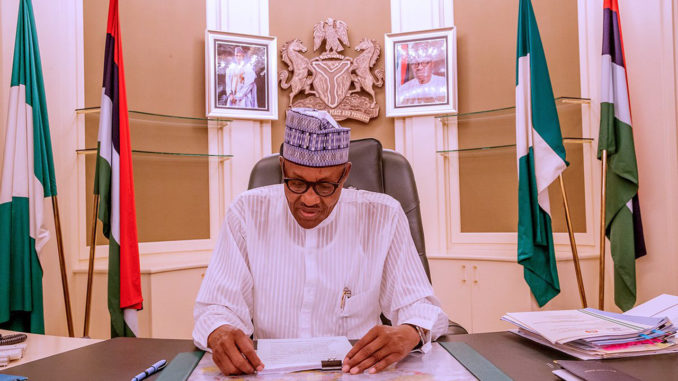
A curious development occurred in Nigeria’s presidency the other day when an important bill relating to the deficiency in the oil industry was signed into law in a foreign country. Called the Deep Offshore and Inland Basin Production Sharing Contract (DOIBPSC), the bill as amended was delivered to the State House, Abuja by the Clerk, National Assembly. Seen as a significant outcome by the presidency, the Chief of Staff to the President issued a statement emphasising the importance of the bill to the extent that the country would save about $1.4 billion annually from the fruit of the amended law. The presidency went to lengths to have the amended bill signed into law in a strange land, England where the president was on a two-week private visit and the photograph of the ceremony was quickly disseminated to the national media.
Expectedly, this strange development in the presidency engendered a heated debate in the public sphere that can be framed as two legalisms. Whereas it is not stated in the basic law whether the president could sign bill into law in a foreign land, the morality of the exercise and its implication for national sovereignty were raised. However, partisans of the incumbent administration have argued that the president could sign into law legal engrossments anywhere in the world, which was reminiscent of former President Yar’Adua unhealthy health saga in Saudi Arabia and the declaration of the Minister of Justice and Attorney-General of the Federation, Mr. Michael Andoakaa that the then president could run the country from anywhere.
In other words, the world is the presidential administrative space. The ruling party’s national chairman, oblivious of our immediate historical impasse re-echoed Andoakaa’s infamous statement in a fit of historical amnesia. In his words, “I think by signing the bill into law at the Nigerian House in London, it shows that where the President is, he is presiding over Nigeria and with the benefit of modern technology. We have passed the Mongo Park era…So, signing it in London for me has also made several statements. Namely, that where ever national interest is involved, the President is on duty and wherever he is he is presiding.” Apart from this, it was argued for the effect that if the president was abroad and signed a document in so far as it was performed in the embassy precincts, it would perhaps have the force of law or some validity.
Legal experts have, however, controverted the partisans and argued that it was wrong to append signature to any Nigerian law outside the country and wondered that upon being gazetted by the government whether it would bear “signed into law on this day……. in London.” The argument went further that even agreements that government agents entered into routinely outside the country were expected to be given force of domestication only by the national parliament.
However, whatever the merit of these arguments, we want to state without ambiguity that the concept of the state as that entity that is endowed by territoriality, population, sovereignty and which has monopoly over the legitimate use of force is handy here. Many states in the international system exist by virtue of the principle of equality of states, which the United Nations confers on member states. In reality, many states are not able to enforce their sovereignty but endures on the basis of juridical sovereignty conferred by the United Nations and only the great powers in the international system enjoy de facto sovereignty. Due to this reality, countries struggle to optimise their sovereignties. It is only a banana republic that goes to lengths undermining its sovereignty. This is the implication of the behaviour of the prevailing administration.
With all seriousness, we would argue here that it is not anything that is legal that is equally morally right. The country is simply witnessing moral impunity. Morality has to do with principles relating to right or wrong. They are articulated into systems that are espoused by private or public agencies and traverse the whole gamut of human transactions. Let it be known that public office is the repository of moral authority. Public officials’ ability to know what is proper or odious to public sensibility is important. We dare reiterate that what is wrong is wrong and cannot be right simultaneously.
What is more, why was it difficult to delegate the power to sign the bill into law to the Vice President who was supposed to be acting at the time?
Indeed, signing a product of the Nigerian legislative process outside the shores of our country is wrong and the whole act undermines the country’s image in the eyes of the international community. Even the additional argument that the United States (U.S.) does it is not only irrational but sheer sophistry. No one has produced any evidence, in this regard. Nigeria is not U.S., anyway. The act was immoral and portrayed the country as a feudal estate at the mercy of a lord. It is proper to remind public officials of the transient nature of power and to be mindful of acts that undermine and de-substantiate our image as the giant of the Africa. The behaviour undermined the president’s Chatham House pledge in the run-up to the 2015 election to the effect that he would “dream and work for a Nigeria that will be respected again in the comity of nations and that all Nigerians will be proud of.’’
Finally, it will be interesting to note what the dateline of the law reads. In other words, was the law signed in Nigeria or United Kingdom? If a wrong thing had been done in the United Kingdom, the president’s men should swallow their pride and vanity and get Nigeria’s leader to sign a proper bill into law inside Nigeria.
END

Be the first to comment